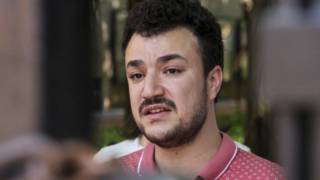HeadlinesAugust 27, 2015
Virginia: Vigils Held for Two Journalists Shot Dead on Live Broadcast
In Virginia, vigils have been held for two journalists who were fatally shot on live television during the morning broadcast Wednesday of the local news station WDBJ in Roanoke. Twenty-four-year-old broadcast journalist Alison Parker and 27-year-old cameraman Adam Ward died after suspected gunman Vester Flanagan opened fire. Flanagan was a former journalist at the station who was fired two years ago. He also went by the name Bryce Williams. After the shooting, he allegedly faxed a 23-page letter to ABC News saying, “I’ve been a human powder keg for a while…just waiting to go BOOM!!!!” Flanagan is African-American. The letter cited racial grievance at WDBJ and several other stations. The letter also said the Charleston shooting was “the tipping point” and that he had put down a deposit for a gun two days after the massacre. Police say Vester Flanagan shot himself later Wednesday as they closed in on his car on the Virginia Parkway. He died in the hospital soon after. President Obama, Democratic presidential candidate Hillary Clinton and other politicians called for increased gun control in the wake of the shooting.
Wal-Mart Will Stop Selling Assault Rifles, Will Still Sell Shotguns
Meanwhile, retail giant Wal-Mart has announced it will no longer sell assault rifles in its stores, although it will continue to sell shotguns. The move, confirmed Wednesday, will end the sale of sporting rifles, which are similar to the military’s AR-15 assault rifle. Wal-Mart said the decision was not impacted by gun politics.
Jorge Ramos to Megyn Kelly: Trump “Has to Answer” on Immigration
Univision new anchor Jorge Ramos has spoken out about being removed from Republican presidential candidate Donald Trump’s press conference Tuesday after he attempted to ask Trump how he would deport 11 million undocumented immigrants. In an interview with Megyn Kelly of Fox News, Ramos, known as the Walter Cronkite of Latino America, said he is still waiting for an answer to his question.
Jorge Ramos: “I’ve been a journalist for 30 years, and I’ve never been ejected from any press conference anywhere in the world. Those are the things that you see in dictatorships, not in the United States of America. And it is very important that he answers the question. He hasn’t answered the questions on how is he going to deport 11 million undocumented immigrants from this country. Can you imagine, Megyn, what would it be? It will require the Army. Is he going to put thousands of immigrants in stadiums and then use buses and airplanes to deport them? That’s not the United States that I know, and he has to answer those questions.”
Ricky Martin on Trump: “Xenophobia is Lowest You Can Go”
Meanwhile, Latin superstar singer and actor Ricky Martin has blasted Donald Trump. “The fact that an individual like Donald Trump, a candidate for the presidency of the United States for the Republican party, has the audacity to continue to gratuitously harass the Latin community makes my blood boil. … Xenophobia as a political strategy is the lowest you can go in search of political power,” he wrote in an op-ed for Univision.
Guatemala: Judge Orders Former VP to Remain in Prison Pending Trial
In Guatemala, a judge has ordered that former Vice President Roxana Baldetti must remain in prison while her corruption trial takes place. The ruling comes on the heels of the Guatemalan Supreme Court’s decision Tuesday to lift the immunity from prosecution for President Otto Pérez Molina, clearing the way for his impeachment. The court passed the impeachment recommendation along to Congress. A general strike has been called for today. We’ll have more on Guatemala after headlines.
Honduras: Protesters Demand Resignation of President for Corruption
Meanwhile, in neighboring Honduras, protesters demanding the resignation of President Juan Orlando Hernández flooded into the streets Wednesday, as a $200 million corruption scandal continues to rock the country.
Saudi Ground Troops Cross into Northern Yemen, Escalating Crisis
In news from Yemen, Saudi ground troops have crossed into northern Yemen. The ground offensive comes after months of U.S.-backed, Saudi-led airstrikes. The ongoing fighting between Houthi rebels and pro-government forces backed by the Saudi-led coalition has killed at least 4,000 people and sparked a humanitarian crisis. Saudi Arabia has denied previous reports that it deployed special operations ground troops to Yemen earlier this spring.
China: 12 Arrested for Explosion at Chemical Facility that Killed 139
In China, 12 people have been arrested following a series of explosions that killed 139 people at a chemical storage facility in the port city of Tianjin 10 days ago. The chairman and senior managers of the company that owned the storage facility are among those arrested. At least 500 people remain in the hospital with injuries associated with the blasts.
South Sudan: President and Rebel Leader Sign Peace Deal
In South Sudan, President Salva Kiir has signed a peace deal with rebel leader Riek Machar that seeks to end the country’s civil war, although the president expressed reservations. Under the deal, Machar will return to his position as vice president. The fighting erupted in 2013 and has claimed tens of thousands of lives.
Austria: 50 Migrants Fleeing Violence Found Dead in Parked Truck
In news from Europe, as many as 50 people fleeing violence in their home countries have been found dead in a parked truck in eastern Austria. It appears that they suffocated during their trip north in efforts to seek asylum in northern European countries.
Mississippi: Judge Temporarily Blocks Executions over Drug Cocktail
A federal judge has temporarily shut down executions in Mississippi after he blocked the state from using the drugs pentobarbital and midazolam during executions. Prisoners say the use of these sedatives as part of a drug cocktail risks inducing excruciating pain and torture during the execution, a violation of the Eighth Amendment. The Mississippi Department of Corrections is appealing the ruling.
Civil Rights Pioneer Amelia Boynton Robinson Dies at 104
And civil rights pioneer Amelia Boynton Robinson died Wednesday at the age of 104. In 1965, she was beaten unconscious as she attempted to cross Selma’s Edmund Pettus Bridge on what became known as Bloody Sunday. She was a lifelong activist for voting rights. President Obama praised her Wednesday, saying, “For most of her 104 years, Amelia committed herself to a simple, American principle: that everybody deserves the right to vote.” In March, Democracy Now! interviewed Amelia Boynton Robinson at the 50th anniversary of Bloody Sunday.
Amy Goodman: “What gave you the courage that day to face those state troopers?”
Amelia Boynton Robinson: “I was born that way. My mother was a civil rights activist back then, when I was born. And I worked with her at 11 years old. I worked with her when women’s suffrage become reality.”
Most popular
- 1
- 2
- 3
- 4
Non-commercial news needs your support
Please do your part today.











Media Options